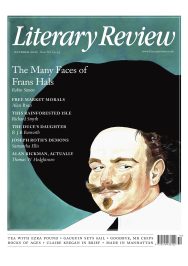Alexander Watson
Under the Double-Headed Dove
Iron and Blood: A Military History of the German-Speaking Peoples Since 1500
By Peter H Wilson
Allen Lane 976pp £40
The Germans have, as West Germany’s erudite first president, Theodor Heuss, once ruefully observed, acquired notoriety as ‘the bellicose nation’. Violence had stamped the German state since unification in the late 19th century and Heuss’s own republic had emerged in 1949 from the ashes of two devastating world wars instigated by German governments. To explain modern Germany’s aggression, Anglophone military historians have often claimed the existence of a uniquely German way of war. Germany, their argument goes, was naturally predisposed to bellicosity thanks to its place at the heart of Europe. Encircled by powerful neighbours, its people inevitably favoured authoritarian rulers able to mobilise for pre-emptive attacks. As Germans usually faced enemies superior in terms of men and materiel, their consistent strategy was to strike hard and win quickly. Their armed forces’ fighting style was characterised by a ruthless obsession with ‘military necessity’, a myopic focus on battlefield tactics and extraordinary violence.
Peter H Wilson, Chichele Professor of the History of War at Oxford University, has written a magnificent new book showing that Germans’ relationship to warfare is far too complex, varied and, indeed, interesting to be distilled so simplistically. Whereas most studies cover only the blood-soaked eighty years from the wars of unification in the 1860s to the end of the Second World War in 1945, Wilson takes his readers through a full half-millennium of German warfare, from 1500 to the present. His book’s geographical scope is similarly vast, encompassing all that once was German-speaking central Europe – lands which extended through and beyond modern Germany, Austria and Switzerland. Iron and Blood describes the martial actions behind the major political upheavals in this territory. Yet it also goes deeper, explaining how professional armies, technology and tactics developed, and how experiences of war and soldiering over a period of five hundred years profoundly shaped German society.
The book opens in the late-medieval heyday of the Holy Roman Empire, an intricate political entity of 226 lordships, counties and priories, eighty-six cities, eighty-three principalities and seven powerful electorates, whose rulers had the right to choose the emperor. A central argument of Wilson’s book is that this wide

Sign Up to our newsletter
Receive free articles, highlights from the archive, news, details of prizes, and much more.@Lit_Review
Follow Literary Review on Twitter
Twitter Feed
It wasn’t until 1825 that Pepys’s diary became available for the first time. How it was eventually decrypted and published is a story of subterfuge and duplicity.
Kate Loveman tells the tale.
Kate Loveman - Publishing Pepys
Kate Loveman: Publishing Pepys
literaryreview.co.uk
Arthur Christopher Benson was a pillar of the Edwardian establishment. He was supremely well connected. As his newly published diaries reveal, he was also riotously indiscreet.
Piers Brendon compares Benson’s journals to others from the 20th century.
Piers Brendon - Land of Dopes & Tories
Piers Brendon: Land of Dopes & Tories - The Benson Diaries: Selections from the Diary of Arthur Christopher Benson by Eamon Duffy & Ronald Hyam (edd)
literaryreview.co.uk
Of the siblings Gwen and Augustus John, it is Augustus who has commanded most attention from collectors and connoisseurs.
Was he really the finer artist, asks Tanya Harrod, or is it time Gwen emerged from her brother’s shadow?
Tanya Harrod - Cut from the Same Canvas
Tanya Harrod: Cut from the Same Canvas - Artists, Siblings, Visionaries: The Lives and Loves of Gwen and Augustus John by Judith Mackrell
literaryreview.co.uk